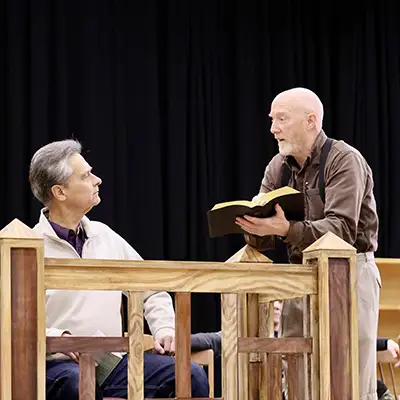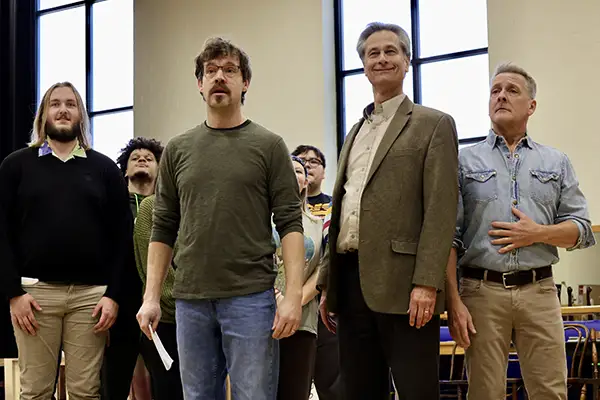Courage to Question

Clarence Brown production of Inherit the Wind celebrates the art and science of asking the big questions.
One hundred years ago and less than 100 miles from the UT Knoxville campus, high-school teacher John Scopes went on trial for violating the Butler Act, which outlawed the teaching of human evolution in Tennessee’s public schools and universities.
Labeled the Scopes Monkey Trial, it attracted a national media frenzy to tiny Dayton, Tennessee, where two of 1925’s most powerful lawyers went head-to-head over questions of science and religion that echo to present times.
As part of this year’s Scopes Trial Centennial, the Clarence Brown Theatre (CBT) presents Inherit the Wind, the 1955 courtroom drama inspired by the historic event. The show runs February 12 through March 2. CBT Associate Artistic Director Katie Lupica directs this freshly reimagined production with today’s audience in mind. The fast-paced drama explores themes of religion, intellectual freedom, and the relationship between social norms and law.
Bringing History Up to Date
“One thing we noted in the script early on is that this is a play about metaphorical and literal truth,” said Lupica. “Theater is really good at metaphorical truth, so that has defined our approach.”
They also sought to explore the question of how historical memory works, since a century has passed since the event and 70 years since the play was first premiered. Some audiences could have limited perceptions of the trial history, and younger students might not be familiar with it at all.
“Any one sentence description of this kind of historical event—the high-school history class sort of answer—can be reductive,” said Lupica.
To bridge this gap while framing the play within a timeless setting, the new production intentionally blends visual and sonic references spanning the years between the 1925 trial and the 1955 play. Through innovative stage setting, costuming, and projected images, they blend fashion, architecture, and sound to pull the story out of a specific point in history.
“We use projection design in innovative ways to remind us that this is, as the playwrights tell us, ‘not too long ago, could be yesterday, could be tomorrow,’” said Lupica. “We’re going for timelessness, acknowledging that the play is not exact history.”
Playwrights Jerome Lawrence and Robert Edwin Lee used the events of the trial to create a drama that addressed not just the evolution question, but the Red Scare of the 1950s, critiquing the scandals fueled by then-Senator Joseph McCarthy as he sought political gain by accusing numerous US citizens of being communists.
UT Faculty Bring Roles to Life
In this edition of Inherit the Wind, the lead roles of lawyers Henry Drummond and Matthew Harrison Brady are played, respectively, by Jed Diamond, associate professor in UT theatre, and Terry Weber, theatre faculty emeritus. Drummond represents the real defense attorney Clarence Darrow, while Brady represents orator and politician William Jennings Bryan. In real life the two lawyers were friends who opposed each other during the Scopes trial. The actors bring their own long-time friendship to these roles.
“We have the opportunity to bring some real heavy hitters in our own community to play the two lawyers,” said CBT Managing Director Tom Cervone. “They are very excited about being able to square off in the courtroom. They’re such good pals, and they’ve worked together for so many years.”
The play is set in a fictional town in an unnamed state, with fictional characters and details that take the play several steps away from historical accuracy.
“The playwrights chose to take the approach of a parable,” said Lupica. “Asking, ‘What are the essential truths that will continue to speak to generations beyond the trial and beyond their own time of writing the play?’ I think they were successful, because it’s a completely urgent and riveting play 70 years later.”
Holding Common Ground
As director, Lupica is intrigued by these elements that keep Inherit the Wind a vital work of art.
“One of the key themes we’re tuned to is the brittleness of certainty, and that includes ours,” says Lupica. “We are working to shake up any certainties that we might bring to the play—presenting it as a story of complexity, rather than simply right versus wrong.”
In this complexity, the play explores the process of scientific inquiry and people’s capacity for learning new things and thinking critically.
“It’s really about not trying to prove or disprove anything, but rather to demonstrate why questioning and learning are so important,” said Lupica. “The play communicates that this isn’t about a battle between science and religion, but between the courage to question and the comfort of certainty, and how we approach new scientific information while maintaining personal convictions.”
By Randall Brown

